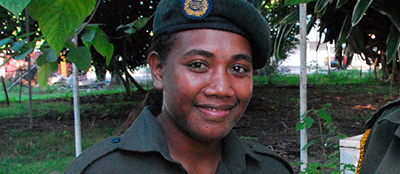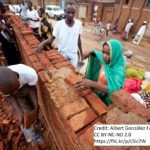Water, sanitation and hygiene are vital for the suppression and treatment of Covid-19. To maintain and increase access to water for the urban poor and other groups during the crisis, eleven African governments have announced various forms of free water. This includes governments paying users bills in some contexts (e.g. Ghana) and provision of water for vulnerable communities ...» more
Governance
Workplace-based Learning and Youth Employment in Africa
Workplace-based learning is a supply-side approach to youth employment that includes practical or on-the-job training that is usually provided through an apprenticeship, internship, learnership , work placement or other practical training component of a vocational education or training programme. For the workplace-based learning approach to be effective, it requires ...» more
Water security beyond Covid-19
Strengthening water security is essential for preventing and combatting future pandemics. Measures to supress the Covid-19 pandemic, including hand-washing, selfisolating and lockdowns assume that societies, communities and households have sustainable access to acceptable amounts of adequate quality water. However, across developing countries, water insecurity is increasing, ...» more
Biodiversity conservation and restoration and Poverty Reduction
Reconciling the twin goals of biodiversity conservation and restoration, and poverty reduction is difficult. A number of factors seem to influence effectiveness across intervention types including context, intervention design, governance and management quality, community engagement and participation, and intervention or programme length. This report largely focuses on outcomes ...» more
Justice systems in the Sahel
This review looks at justice provision in four countries in the Sahel: Mali, Niger, Burkina Faso and Chad. All feature formal (state) justice systems alongside customary/religious justice, with the latter typically being seen by citizens as more accessible, cheaper and less corrupt. State justice systems in all the countries face similar challenges: corruption, resource and ...» more
The use of fossil fuels in the Middle East and North Africa
This rapid literature review collates evidence from academic and grey literature on the use of fossil fuels in the Middle East and North Africa (MENA). MENA, for much of its recent history, has been known for its energy wealth. The region is, however, significantly diverse, not only in terms of economic and political structures, but also in terms of energy resource and ...» more
Responding to popular protests in the MENA region
This review looks at government responses to violent protests in a selection of countries in the Middle East and North Africa (MENA). Focusing on the 2011 Arab Spring protests, it finds that the initial response of most regimes was violent repression – Tunisia where the president stepped down, and Morocco and Jordan where the respective monarchies promised reform, are the only ...» more
Social and behaviour change communication interventions in Mozambique
Social and behaviour change communication (SBCC) is the use of communication to change behaviours by positively influencing knowledge, attitudes and social norms at the individual and community level. Approaches to SBCC include, but are not limited to: media campaigns, peer educators and mentors, small group sessions, community dialogues and events, and digital tools. This ...» more
Fossils fuels and job creation in Africa
Fossil fuel development, including oil, gas and coal, can provide or support employment in a number of different ways. Estimates for Africa’s extractive sector as a whole put it as employing less than 1% of Africa’s workforce (Fine et al., 2012). However, it is hard to determine the number of jobs supported directly or indirectly by the fossil fuels industry in different ...» more
Aid and non-state armed groups
This rapid literature review collates lessons related to aid (conditionality) and non-state armed groups (NSAGs). This is a companion paper to Herbert (2019)1 which looks more broadly at lessons from the use of aid conditionality in peace processes, that paper includes greater detail on what conditionality is. While the question posed sought to find information on where ...» more
Lessons from stabilisation, statebuilding, and development programming in South Sudan
This rapid literature review collates lessons from major evaluations and learning reviews from development, state-building and stabilisation programming in South Sudan since independence in 2011. Key findings include: Donors in South Sudan have had to transition from humanitarian to development aid and back and forth a number of times as conflict has broken out. Donors ...» more
Support for civil society engagement in peace processes
There is a widespread acknowledgement of the importance of civil society engagement in peace processes (Inclusive Security, 2013; Peace Direct, 2019). This is reflected in the wide range of interventions being carried out by various donors to support such engagement. This review looks at the effectiveness of interventions specifically aimed at supporting civil society groups ...» more
Political economy of Papua New Guinea and the water, sanitation and hygiene sector
The political economy of Papua New Guinea is characterised by formal and customary governance actors, structures and institutions, weak governance and corruption. Traditional institutions and structures including ‘big man’ politics, the wantok system and customary land tenure have been overlaid with formal governance structures including national, provincial and local ...» more
Interventions to Reduce Forced Marriage
This review drew largely on academic papers as well as reports by international development organisations. Evidence and hence lessons on how to combat forced marriage are limited and sometimes contradictory. Overall, the literature points to a number of approaches that can be effective, notably: empowerment of girls; community approaches to change social norms and attitudes on ...» more
Non-State Policing in Fragile Contexts
Non-state policing refers to the use of non-state (informal) actors, e.g. vigilante groups, private security firms, to carry out ‘law and order’ functions (preventing crime, investigating, detaining and punishing those responsible for crimes). Non-state policing is not a synonym for community policing (a much broader term, usually associated with formal police agencies) but ...» more
G7 and G20 commitments on health
The health issues that have received the most consistent attention in G7 and G20 summit declarations, having been addressed in more than half of the summits since 2015 and appearing in 30 or more commitments over that time, are: Health systems strengthening Infectious diseases (including HIV/AIDS, tuberculosis, malaria, polio, neglected tropical diseases, and ...» more
Drivers and enablers of serious organised crime in Southeast Asia
There are many definitions of organised crime. The UN Office on Drugs and Crime (UNODC) has developed a general definition: Organized crime is a continuing criminal enterprise that rationally works to profit from illicit activities that are often in great public demand. Its continuing existence is maintained through corruption of public officials and the use of intimidation, ...» more
Public Sector Reform and Capacity Building in Small Island Developing States
Small Island Developing States (SIDS) experience capacity constraints relating to their small size, remoteness and dispersion (in the case of island archipelagos), which impinge on the quality of the public sector (Horscroft, 2014; Mycoo & Donovan, 2017). This rapid literature review summarises the evidence on public sector reform and capacity building initiatives in SIDS. ...» more
Implications of Not Addressing Mental Health and Psychosocial Support (MHPSS) Needs in Conflict Situations
This review of existing literature indicates that there are a number of significant implications of not addressing mental health and psychosocial (MHPSS) needs of children, youth, and adults in conflict settings. Mental health consequences of war are by now fairly well documented (see for example Murthy and Lakshminarayana, 2006; Werner, 2012; Betancourt et al., 2014; ...» more
Government Communication Capacity and Media Freedom
The aim of this rapid literature review is to examine the relationship between government communication services and media freedom. However, this relationship receives little mention in the literature on media development and media freedom. Hence, it is very difficult to reach a consensus on the relationship between government communication services and media freedom due to the ...» more



